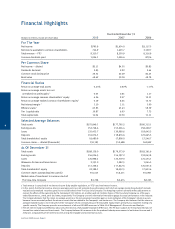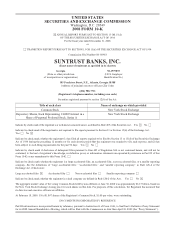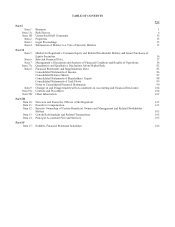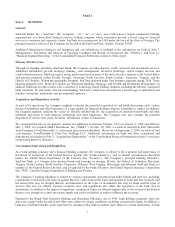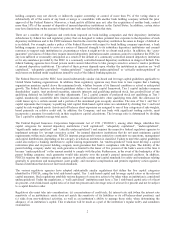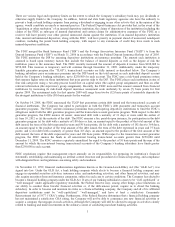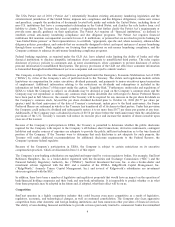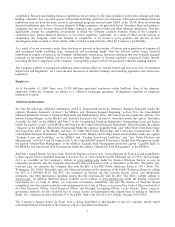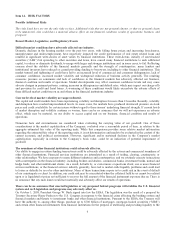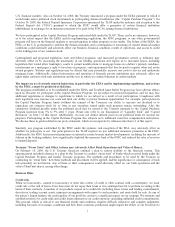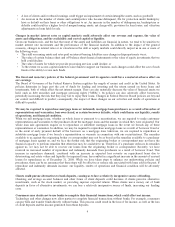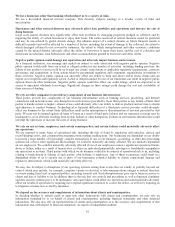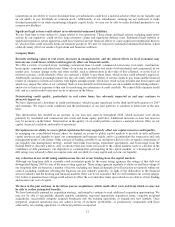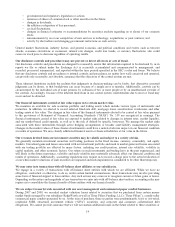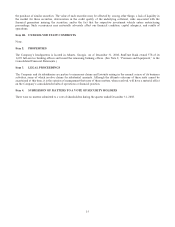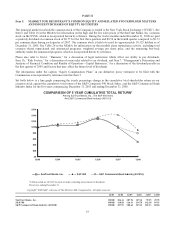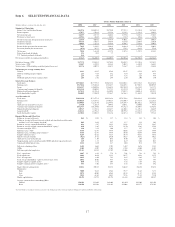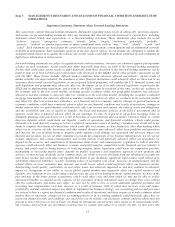SunTrust 2008 Annual Report Download - page 20
Download and view the complete annual report
Please find page 20 of the 2008 SunTrust annual report below. You can navigate through the pages in the report by either clicking on the pages listed below, or by using the keyword search tool below to find specific information within the annual report.repay their loans. As is the case with any such assessments, there is always the chance that we will fail to identify the proper
factors or that we will fail to accurately estimate the impacts of factors that we identify.
Weakness in the economy and in the real estate market, including specific weakness within our geographic footprint,
has adversely affected us and may continue to adversely affect us.
If the strength of the U.S. economy in general and the strength of the local economies in which we conduct operations
decline, or continue to decline, this could result in, among other things, a deterioration of credit quality or a reduced demand
for credit, including a resultant effect on our loan portfolio and allowance for loan and lease losses. A significant portion of
our residential mortgages and commercial real estate loan portfolios are composed of borrowers in the Southeastern and
Mid-Atlantic regions of the United States, in which certain markets have been particularly adversely affected by declines in
real estate value, declines in home sale volumes, and declines in new home building. These factors could result in higher
delinquencies and greater charge-offs in future periods, which would materially adversely affect our financial condition and
results of operations.
Weakness in the real estate market, including the secondary residential mortgage loan markets, has adversely
affected us and may continue to adversely affect us.
Significant ongoing disruptions in the secondary market for residential mortgage loans have limited the market for and
liquidity of many mortgage loans. The effects of ongoing mortgage market challenges, combined with the ongoing correction
in residential real estate market prices and reduced levels of home sales, could result in further price reductions in single
family home values, adversely affecting the value of collateral securing mortgage loans that we hold, mortgage loan
originations and profits on sales of mortgage loans. Declining real estate prices have caused higher delinquencies and losses
on certain mortgage loans, particularly Alt-A mortgages and home equity lines of credit and mortgage loans sourced from
brokers that are outside our branch bank network. These trends could continue. These conditions have resulted in losses,
write downs and impairment charges in our mortgage and other lines of business. Continued declines in real estate values,
home sales volumes, financial stress on borrowers as a result of job losses, interest rate resets on adjustable rate mortgage
loans or other factors could have further adverse effects on borrowers that could result in higher delinquencies and greater
charge-offs in future periods, which adversely affect our financial condition or results of operations. Additionally,
counterparties to insurance arrangements used to mitigate risk associated with increased foreclosures in the real estate market
are stressed by weaknesses in the real estate market and a commensurate increase in the number of claims. Additionally,
decreases in real estate values might adversely affect the creditworthiness of state and local governments, and this might
result in decreased profitability or credit losses from loans made to such governments. A decline in home values or overall
economic weakness could also have an adverse impact upon the value of real estate or other assets which we own upon
foreclosing a loan and our ability to realize value on such assets.
Weakness in the real estate market may adversely affect our reinsurance subsidiary.
The Company has a subsidiary (Twin Rivers Insurance Company) which provides mortgage reinsurance on certain mortgage
loans through contracts with several primary mortgage insurance companies. Under these contracts, Twin Rivers Insurance
Company (“Twin Rivers”) provides aggregate excess loss coverage in a mezzanine layer in exchange for a portion of the
pool’s mortgage insurance premiums. The reinsurance contracts are intended to place limits on Twin Rivers’ maximum
exposure to losses by defining the loss amounts ceded to Twin Rivers, as well as by establishing trust accounts for each
contract. The trust accounts, which are comprised of funds contributed by Twin Rivers plus premiums earned under the
reinsurance contracts, are maintained to fund claims made under the specific reinsurance contracts with individual primary
mortgage insurers and are independent of each other. If claims exceed funds held in the trust accounts, Twin Rivers does not
expect to make additional contributions beyond future premiums earned under the existing contracts. Twin Rivers maintains
a reserve for estimated losses under its reinsurance contracts, which is an estimate of losses resulting from claims to be paid
by the trusts. On an ongoing basis, Twin Rivers assesses the sufficiency of future revenues, including premiums and
investment income on funds held in the trusts, to cover future claims.
Due to the deterioration of the real estate market and an increase in defaults under mortgage contracts, the funds in certain
trusts may be less than the obligations created under such contracts. Twin Rivers does not believe it is required nor does it
intend to make additional capital contributions to cover obligations in excess of funds held by the trusts; however, Twin
Rivers’ profitability could be adversely affected if the primary mortgage insurance companies pursue Twin Rivers for such
shortfalls.
As a financial services company, adverse changes in general business or economic conditions could have a material
adverse effect on our financial condition and results of operations.
A sustained weakness or weakening in business and economic conditions generally or specifically in the principal markets in
which we do business could have one or more of the following adverse impacts on our business:
• A decrease in the demand for loans and other products and services offered by us;
• A decrease in the value of our loans held for sale or other assets secured by consumer or commercial real estate;
• An increase or decrease in the usage of unfunded commitments;
8


